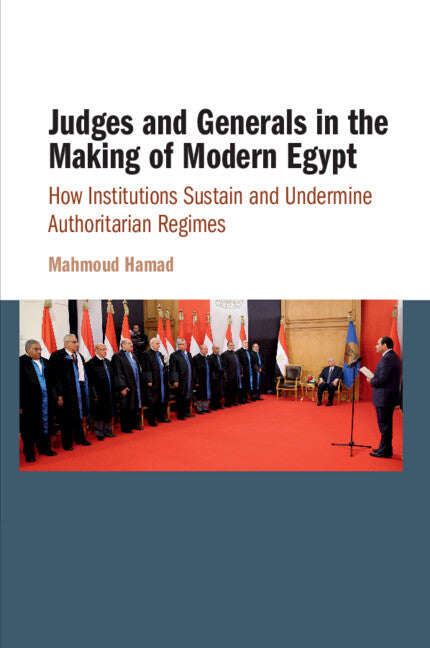Freshly Printed - allow 8 days lead
Couldn't load pickup availability
Judges and Generals in the Making of Modern Egypt
How Institutions Sustain and Undermine Authoritarian Regimes
Discusses why and how the Egyptian judiciary was critically important in bringing down two vastly different regimes in three years.
Mahmoud Hamad (Author)
9781108442442, Cambridge University Press
Paperback / softback, published 19 May 2022
335 pages, 8 b/w illus. 5 tables
22.8 x 15.2 x 1.6 cm, 0.49 kg
'The book is a fascinating account of the role of the judiciary in modern Egyptian politics. As well as being of interest to those wanting to understand more about the particular history of the judiciary in Egypt, Judges and Generals in the Making of Modern Egypt provides more generalizable insights into the ways in which a degree of judicial independence can lend credibility to non-democratic governments. In particular it persuasively argues that the judiciary can be useful for an autocratic regime in providing an institutional foundation as a base for its longer-term survival. This book is an important point of reference for anyone interested in the relationship between judges and politicians in the context of non-democratic regimes.' Kate Malleson, Queen Mary, University of London
Why do authoritarian regimes survive? How do dictators fail? What role do political institutions play in these two processes? Many of the answers to these questions can be traced to the same source: the interaction between institutions and preferences. Using Egypt as a case study, Professor Mahmoud Hamad describes how the synergy between judges and generals created the environment for the present government and a delicate balance for its survival. The history of modern Egypt is one of the struggle between authoritarian governments, and forces that advocate for more democratic rights. While the military has provided dictatorial leaders, the judiciary provides judges who have the power to either support or stymie authoritarian power. Judges and Generals in the Making of Modern Egypt provides a historically grounded explanation for the rise and demise of authoritarianism, and is one of the first studies of Egypt's judicial institutions within a single analytical framework.
1. Introduction
2. The historical legacies and the institutional culture of the Egyptian judiciary
3. Nasser's Egypt: charisma, populism, and the attacks on judicial independence
4. The years of Sadat: crisis, regime survival, and the awakening of judicial activism
5. Judicial politics under Mubarak: judges and the fall of the Pharaoh
6. The scaf, the courts, and Islamists: judges and the political transition
7. Mursi and the judiciary: the self-fulfilling prophecy
8. Patricians and plebeians: the chief justice paves the road to the general
9. Old wine in a new bottle: Ssisi, judges, and the restoration of the ancien régime
References
Index.
Subject Areas: Constitutional & administrative law [LND], Military administration [JWJ], Regional government [JPR], Social theory [JHBA]


